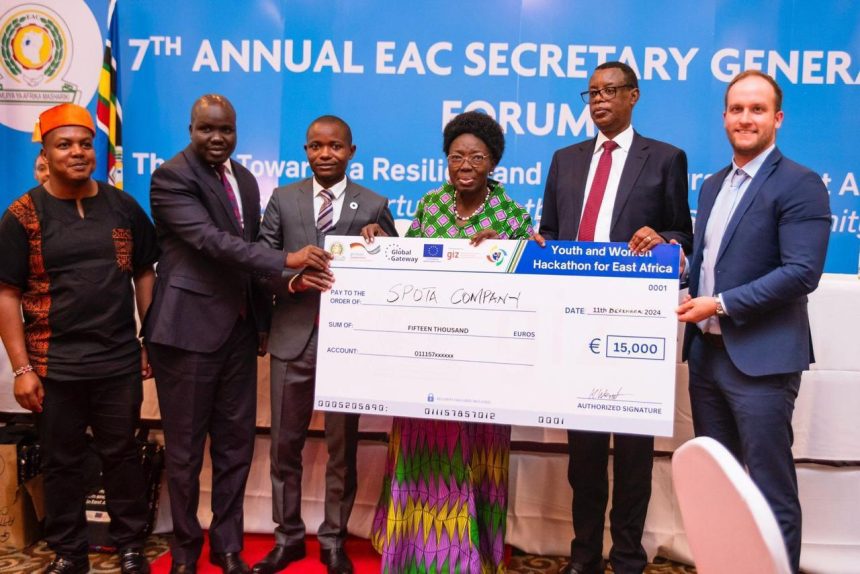Nairobi, Kenya(SONNA)-Eight youth and women innovators from EAC Partner States have won a total of €120,000 to scale their innovative solutions for addressing the region’s economic challenges.
The regional hackathon, was held in Nairobi, Kenya, during the 7th Annual Secretary General’s Forum. The forum was held under the theme, “Towards a Resilient and Fully Integrated East Africa: Harnessing Opportunities in the Borderless Community,” and tackled the multifaceted challenges facing the region, while exploring opportunities for collective growth and development.
It also served as a platform for citizens to contribute to the policymaking process, identify issues affecting them and collaborate on strategies for a shared future of integration and a borderless community.
The event featured a pitching session for women and youth-led projects aimed at solving regional economic integration challenges. The EAC-GIZ LIFTED project was co-financed by the European Union and the German Federal Ministry for Economic Cooperation and Development (BMZ), in partnership with the EAC Secretariat.It attracted over 1,000 innovative solutions in sectors such as tourism, agribusiness, environmental protection, trade, digitalization, and financial services from youth and women across East Africa.
Each project had the opportunity to present its unique solution to a distinguished jury during the main plenary session on December 11, attended by the EAC Secretary General, ministers, permanent secretaries, and representatives from civil society and the private sector. The presentations highlighted the potential impact of the initiatives in addressing regional economic integration challenges. After each presentation, a dynamic question and answers session encouraged in-depth discussions, providing valuable feedback to the participants and fostering collaboration and knowledge-sharing among the diverse projects.
The eight winning projects, four led by women and four by youth, were awarded €15,000 each as part of the financial and technical support from EAC GIZ.
Speaking during the session, the EAC Secretary General, Hon. Veronica M. Nduva, acknowledged the significance of the regional hackathon as a testament to the community’s collective commitment to innovation, inclusivity, and sustainable development within the EAC. She expressed gratitude to the European Union and GIZ for their support in making both the Forum and the hackathon possible.
Hon. Nduva emphasized that the future of the region lies in the hands of women and youth, who are the driving forces behind innovation, creativity, and economic resilience. She stated, “The hackathon brings together diverse minds to brainstorm, collaborate, and develop innovative solutions to real challenges. This event is not just about competition, but about collaboration, learning, growth, and harnessing the collective intelligence of our women and youth to address the pressing economic issues facing our region”.
On her part, Hon. Rebecca Kadaga, the 1st Deputy Prime Minister of Uganda and Minister for East African Community Affairs, commended the EAC for its leadership in organizing the Secretary General’s Forum and the Regional Hackathon initiative.“These initiatives are attests EAC’s commitment to regional development and are a powerful demonstration of how collaboration across sectors can unlock the potential of our people. By supporting youth and women-led solutions, we are building a more inclusive and prosperous East Africa,” she stated.
On his part, Rwanda’s Minister of State for Foreign Affairs in charge of Regional Cooperation, Gen. James Kabarebe, emphasized the importance of such platforms in driving regional collaboration and innovation.
“These initiatives are vital in fostering cooperation and empowering our youth and women to play a central role in shaping the future of our region. The EAC continues to lead by example in creating opportunities that advance economic integration and development across East Africa,” he said.
Kenya’s Principal Secretary for the Ministry of East African Community and Regional Development, Hon. Abdi Dubat emphasized the value of the discussions in highlighting both the challenges and opportunities within the EAC region.
“The insights shared throughout these discussions have clarified the challenges we face and illuminated a path forward. While the journey ahead may have its hurdles, our shared commitment, collaboration, and practical solutions will shape East Africa’s future and help realize a resilient, integrated region,” he stated.
In his remarks, Mr Marius Weist, GIZ’s Component Lead for Organisational Development and Outreach, emphasised the importance of empowering women and youth to achieve EAC’s economic goals and foster an inclusive economy. Mr Weist
praised the enthusiasm of the women and youth hackathon participants, noting their creative solutions for regional challenges.“By providing women and youth with the tools and support needed to solve real-economic challenges, GIZ aims to create a more inclusive economy that benefits everyone.” He added
The 7th Annual Secretary General’s Forum presented several key recommendations for advancing regional integration. EAC Partner States were urged to remove barriers to the free movement of goods, services, and people, including mutual recognition of professional qualifications. Additionally, the EAC Secretariat was encouraged to strengthen youth representation in policy and decision-making.
The Forum also recommended enhancing training for SMEs on trade procedures and documentation and addressing language barriers by translating key documents into multiple languages. Partner States were urged to prioritize small-scale farmers in green initiatives and to develop inclusive policies for sustainable agriculture and renewable energy solutions.
Local governments were called to actively participate in EAC decision-making, while the EAC Secretariat was encouraged to facilitate cross-border dialogues to address emerging issues. In the health sector, the harmonization of health insurance systems and healthcare standards was recommended, along with increased investment in local pharmaceutical manufacturing.
Further, the forum highlighted the need for expanded digital infrastructure in rural areas to support SMEs and called for policies that promote digital adoption and create a favorable regulatory environment for innovation.
The forum follows the adoption of the EAC Consultative Dialogue Framework (CDF), a structured guide aimed at ensuring inclusive and consultative participation of the private sector, civil society, professional associations, other interest groups, and the EAC towards realising the community objectives and promoting a people-centred and market-driven integration process.





